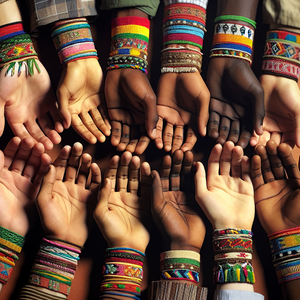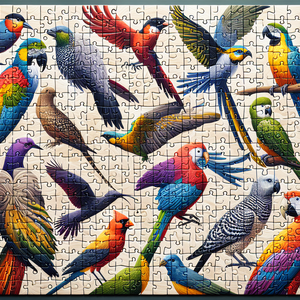Creativity Across Cultures: How Diversity Fuels Innovation

Creativity thrives at the intersection of diverse ideas and perspectives. When people from different cultural backgrounds come together, they bring with them unique ways of interpreting the world, shaped by their upbringing, traditions, and experiences. This diversity of thought is often referred to as "cognitive diversity," and it plays a pivotal role in driving innovation. Cognitive diversity encompasses differences in thinking styles, problem-solving approaches, and decision-making processes, which can lead to more dynamic and well-rounded solutions. For example, someone raised in a collectivist culture may prioritize group harmony and collaborative solutions, while someone from an individualist society might focus on independent, out-of-the-box thinking. By combining these perspectives, teams can develop solutions that are both innovative and practical, addressing the needs of a broader audience. Research supports the idea that diverse teams outperform homogenous ones in creative problem-solving. A 2017 study published in the *Harvard Business Review* found that diverse teams are more likely to challenge assumptions, avoid groupthink, and consider a wider range of possibilities. This is because individuals from different backgrounds are less likely to conform to a single perspective and more likely to bring unique contributions to the discussion.
Real-World Examples of Cultural Creativity in Action
Some of the most successful companies in the world have embraced cultural diversity as a driver of innovation. Their stories illustrate how blending unique viewpoints can lead to transformative ideas and global success. For example, Airbnb, a pioneer in the travel and hospitality industry, exemplifies how cultural diversity can fuel innovation. Recognizing that their platform would cater to a global audience, Airbnb's founders built a team that included individuals from various cultural and professional backgrounds. This diversity allowed the company to design a platform that feels both universal and culturally sensitive. Similarly, Samsung, a South Korean tech giant, operates research and development (R&D) centers around the world, where diverse teams work together to create products that cater to global markets. Gucci, under the creative direction of Alessandro Michele, has drawn inspiration from a wide range of cultural influences to redefine luxury fashion and appeal to a broader audience.
Strategies for Leaders: Harnessing Creativity Across Cultures
While the benefits of cultural diversity are clear, unlocking its full potential requires intentional leadership. Leaders must create an environment where multicultural teams feel empowered to share their ideas, collaborate effectively, and overcome potential challenges. Strategies include encouraging open communication, leveraging cross-cultural training, celebrating differences, focusing on inclusive leadership, and recognizing and rewarding innovation. For instance, fostering a safe and inclusive environment, providing training on cross-cultural communication, and celebrating cultural holidays can help create a sense of belonging. Inclusive leadership ensures all voices are heard, and recognizing innovative ideas reinforces the value of diversity.
Overcoming Challenges
While culturally diverse teams offer numerous benefits, they also come with challenges. Language barriers, differing work styles, and conflicting cultural norms can create friction if not proactively managed. However, these challenges can be reframed as opportunities for growth. For instance, language barriers can be addressed by using technology, such as translation tools, or by establishing shared languages for collaboration. Similarly, varying work styles can be harmonized by creating flexible workflows that accommodate different preferences. Leaders who approach these challenges with empathy and a solutions-oriented mindset can turn potential roadblocks into catalysts for innovation.
In an era where innovation drives success, cultural diversity is a powerful asset that organizations cannot afford to overlook. By bringing together individuals with unique perspectives and experiences, companies can foster creativity, challenge conventional thinking, and develop solutions that resonate globally. Real-world success stories from companies like Airbnb, Samsung, and Gucci demonstrate the transformative power of diversity in action. However, simply assembling a multicultural team is not enough. Leaders must take deliberate steps to create an environment where creativity can thrive, from encouraging open communication to celebrating differences and providing cross-cultural training. By doing so, they can unlock the full potential of their teams and drive innovation that transcends borders. As the workplace continues to evolve, organizations that embrace cultural diversity as a driver of creativity will be the ones that lead the way in shaping the future. In a world where innovation knows no boundaries, the most groundbreaking ideas will emerge when cultures collide and creativity flourishes.
Diversity, Equity, and Inclusion (DEI) Strategist
Google, Deloitte, Procter & Gamble, and nonprofits
Responsibilities
Develop and implement DEI strategies to foster inclusive workplace environments.
Conduct cultural competency training and workshops for employees at all levels.
Analyze workforce data to identify diversity gaps and recommend actionable solutions.
Skills/Qualifications
Expertise in cross-cultural communication and organizational change management.
Familiarity with legal compliance related to diversity and anti-discrimination laws.
Strong analytical skills to interpret employee engagement surveys and metrics.
Global Product Manager (Culturally Adapted Solutions)
Samsung, Airbnb, Unilever, and Amazon
Responsibilities
Lead the development of products tailored to meet the needs of diverse markets.
Collaborate with multicultural teams to ensure cultural sensitivity in product design and marketing.
Conduct market research to understand regional consumer preferences and behaviors.
Skills/Qualifications
Experience in international business or product management.
Proficiency in cultural adaptation strategies and localization practices.
Knowledge of trends and consumer habits in key global markets (e.g., Asia, Europe, Latin America).
Cross-Cultural Innovation Consultant
McKinsey & Company, IDEO, PwC, and multinational corporations
Responsibilities
Facilitate workshops to help teams integrate diverse perspectives into creative problem-solving.
Develop frameworks for leveraging cognitive diversity in innovation pipelines.
Provide leadership coaching on managing multicultural teams effectively.
Skills/Qualifications
Strong background in innovation methodologies like Design Thinking or Agile.
Expertise in multicultural team dynamics and conflict resolution.
Ability to assess and enhance team creativity through cultural collaboration.
Intercultural Marketing Specialist
Nike, Coca-Cola, L’Oréal, and advertising agencies
Responsibilities
Design marketing campaigns that resonate with culturally diverse audiences.
Translate global branding strategies into culturally relevant messaging for local markets.
Work closely with regional teams to ensure brand consistency across cultures.
Skills/Qualifications
Fluency in multiple languages and proficiency in cultural marketing trends.
Experience with data analytics to measure campaign performance across regions.
Creativity in storytelling and crafting narratives that appeal to multicultural audiences.
Multicultural Team Coach (Leadership Development)
IBM, Microsoft, Siemens, and leadership development firms
Responsibilities
Train leaders on fostering collaboration and inclusivity in global teams.
Address challenges such as language barriers, time zone differences, and cultural misalignments.
Create tools and resources to improve team cohesion and productivity in diverse settings.
Skills/Qualifications
Certification in leadership coaching or intercultural competency (e.g., CQ or GCI).
Deep understanding of global team dynamics and remote work strategies.
Strong facilitation skills and the ability to navigate complex cultural scenarios.


